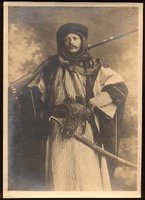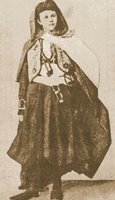I haven't told you about Isabelle Eberhardt yet. She's one of my favorite Bad Girls, a dreamy figure who devoted her short life to self-reinvention. A natural vagabond, she went wandering round North Africa in search of spirituality, sex and hashish years before the hippies of the 1960s went there for the same reasons. You could say she died for love of the image she had of herself.
Born in 1877, Isabelle Eberhardt was a Russian Jew who grew up in Switzerland in a community of anarchist nihilists--a fact that suggests the deep waters she swam in from the time she was a baby. She was passionate and troubled as a girl, and madly in love with her brother Augustin, who taught her how to smoke hashish. Her father taught her to ride horses, study languages and theology, and dress as a boy. And as she studied Arabic, history and ancient religions, Isabelle searched for herself, she searched and she searched, and she tried to understand who she was and where she fit in. She poured her anguish into the private well of her journals:
I must learn to feel more deeply, to see better, and especially, more and more, to think.As her taste for the Middle East developed, she fell in love with a man who would come to rival Augustin's affections. He was Julien Viaud, a French lieutenant with poetic inclinations, a writer twenty-seven years older than she, who adopted the pseudonym Pierre Loti in 1876 and began publishing romantic tales of the Orient. In 1895, when Isabelle was 18, Loti's epic poem
Le Désert, detailing his travels via camel from Suez to Gaza, was published in Paris. Its popularity swept across Europe and landed on the doorstep of Isabelle's family home in Geneva, an upright bourgeois town that Isabelle was desperate to abandon.
"Every morning you wake up in a different setting of the vast desert," Loti wrote. "You leave your tent and are surrounded by the splendor of the virginal morning. You stretch your arms and half-naked body in the cold pure air. Out on the sand, you wrap your turban and drape yourself in your white woolen veils. You get drunk on light and space. At the time of waking, you know the heady intoxication of just being able to breathe, just being alive . . .And then off you go, perched atop the ever-moving camel that steadily plods along until nighttime. You go along, go along, go along, and you see in front of you a hairy head decorated with shells and its long neck, cutting the air like the prow of a ship at sea."
Thus began Isabelle's love affair with Loti, and she devoured everything he wrote, including his first novel,
Aziyadé, published in 1877, the year Isabelle was born. It's the story of his hero's illicit love for Aziyadé, a Turkish woman he meets while traveling on assignment in her country to pacify and colonize the Turks. Loti writes of the soldier's arrival in Istanbul and visit to a tailor who strips him of his lieutenant’s uniform and outfits him in full Turkish dress: a gold jacket with flowing sleeves, a turban, silver daggers in his belt.
The photo you see below on the left is of Loti himself. You might say, in fact, that the hero of Aziyadé is Loti himself. He slips out the tailor’s back door and into the hidden passageways of Istanbul’s bazaar and mosques, enjoying the disguise that could get him killed if his true identity were to be revealed. Veiled women pass him in the street, and he hears them say that such a handsomely dressed gentleman could only be a white Albanian. “At the end of this trail there waits the love of a Turkish woman, the wife of a Turk, a crazed passion that makes no sense considering our time and place," Loti writes. "You might say that to be capable of such an act, one must be deeply egotistical; I won’t argue with that; but I had begun to think that anything which pleases me must be a good thing and that one must always do one’s best to spice up the dull food of life.”

 Here's my theory: Inspired not only by his tale of dangerous Oriental love but by his gift for disguise and self-invention, Isabelle wanted to be Loti.
Here's my theory: Inspired not only by his tale of dangerous Oriental love but by his gift for disguise and self-invention, Isabelle wanted to be Loti. During those precious years of her youth when she wondered who she would become, she visited a photographer's shop and created the self-portrait you're looking at now on the right, Isabelle's Orientalist fantasia of the heroic Muslim male. In my research, I've found no evidence that Isabelle actually saw any pictures of Loti, but the striking similarities of these two images lead me to believe that she did.
And her journal entries after Loti came into her life suggest Loti had just as great an influence on her writing style. Here's a passage from Isabelle: "I detest cultivated green country full of crops. Why do I have this morbid craving for a barren land and desert wastes? Why do I prefer nomads to villagers, beggars to rich people? Aie yie yie! For me, unhappiness is a sort of spice."
Two years after reading
Le Désert, Isabelle traveled to Algeria and converted to Islam, renamed herself Si Mahmoud (why not? Loti had renamed himself), dressed every day as an Arab male, and with a great sense of purpose lived like a man, especially after her initiation into the Kadriya brotherhood of Sufis. Si Mahmoud married a spahi soldier--Slimène, an Algerian man who served under the French military--and spent the rest of her (his?) life obsessed with the Sahara Desert, riding horseback over the sand dunes and coming to know the lives of villagers and nomads.
Slimène tried to make a home for them, but Si Mahmoud was restless and often preferred to live among the soldiers of the Foreign Legion. She would prowl around at night, have sex with the Arabic boys who took her fancy, smoke kif, and drink absinthe, kummel, chartreuse and cognac until she passed out on the floor of whatever random café she was drinking in. It was Isabelle Eberhardt's ambition to be a great writer, and while she did keep journals and serve as a war correspondent for the
El Akhbar newspaper in the Sud Oranais, Isabelle never got very far with her ambitions. She died in a freak flood in the desert in 1904 when she was twenty-seven.




